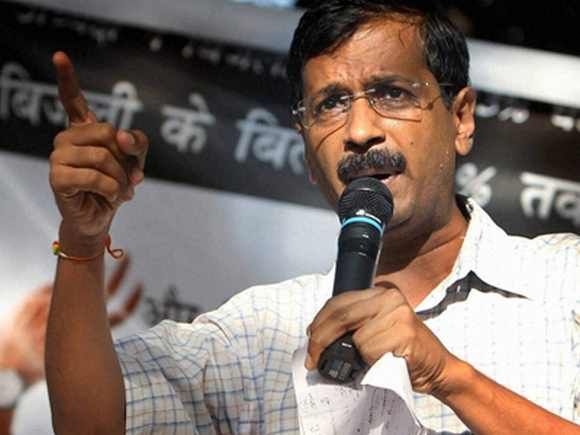 With Centre, state and municipal governments passing the buck on issues as critical as sanitation, Aditi Phadnis looks at the revolving door politics that is often played with the running of local self government
With Centre, state and municipal governments passing the buck on issues as critical as sanitation, Aditi Phadnis looks at the revolving door politics that is often played with the running of local self government
On October 2, 2014, early in the day, Aam Aadmi Party national convenor Arvind Kejriwal, undertook the cleaning of a choked drain at B R Camp in New Delhi.
After mucking out with workers, Kejriwal had breakfast with the safai karamcharis (cleaning staff) and families of the area. The ubiquitous broom stood next to him.
AAP noted: "A clean India will only be possible if the concerned authorities are ready to go beyond symbolism," along with links to photographs.
So deeply impressed was Kavya Thakur, an AAP supporter, by Kejriwal's sincerity that she wrote on Facebook: 'Kavyathakur mange dil sey, Arvind chahiye pir sey...' (sic).
On March 31, 2015, after AAP gave Kavya Thakur more than expected -- 67 seats in the Delhi Assembly out of 70 -- the same safai karamcharis had taken to the streets and were burning effigies of their chief minister.
They had struck work because they hadn't been paid for several months and Kejriwal seemed powerless to address the structural problems afflicting governance in Delhi. His solution was so simple it was laughable.
"Dissolve the municipal corporations on charges of financial mismanage and put us in charge," his government said.
At the heart of the demand was the refrain of all those who, having got power, want more.
East and North Delhi, meanwhile, were a mess. Towers of garbage were piled up on both sides of the road. The safai karamcharis brought garbage and shovelled it across the roads and outside housing colonies.
Hospital waste lay mingled with human refuse. Residents reported that several two-wheelers had wobbled on the slime and had fallen because the roads were so slick with waste. For that one week, it was impossible to believe that this was India's capital.
The safai karamcharis are now back at work. The East and North Municipal Corporations have cleared most of their salary arrears. They have reportedly diverted money from one head to another to do so.
But over the stench of the garbage is the lingering smell of politics. AAP says it was corruption and mismanagement that had brought the East and North Delhi Municipal Corporations to such a pass. But it doesn't really spell out what it is going to do about it.
These problems have their origin in 2012 when for political reasons of her own then Chief Minister Sheila Dikshit put in motion the trifurcation of Delhi's Municipal Corporation.
The ostensible reason was that locals knew best what they needed, so decentralisation would mean more effective governance. The real reason was Dikshit wanted to cut down to size, some leaders and promote others.
The trifurcation happened but in a manner that was not financially sustainable.
The South Delhi Municipal Corporation, where even illegal unauthorised colonies are wealthy and well-connected, spotted revenue earning opportunities such as property tax, parking fee and other levies, and quickly leveraged them to provide residents everyday amenities like garbage disposal.
But both North and East, which made the case even when they were created, that they would not have the funds to sustain themselves and for the initial period, would need subsidies, were indulged.
However, the gravy train ran out quickly.
In newspaper interviews, B B Tyagi, the standing committee chief of the East Delhi Municipal Corporation explained basic maths: "Our monthly expenditure is around Rs 100 crore. This amounts to Rs 1,200 crore annually. The revenue generated every year, however, is just Rs 700-750 crore."
So, obviously, the EDMC was in debt. The case of the North Delhi Municipal Corporation was no better.
The state government is supposed to keep giving the two corporations grants till they can stand on their feet. This money also comes from the ministry of urban development, given that Delhi is a special administrative case.
But Urban Development Minister Venkaiah Naidu was blunt: "Why should I give them money? Why should citizens of India from Visakhapatnam pay for Delhi's financial irresponsibility? I will not give them a penny."
When reminded that the Bharatiya Janata Party was in charge of EDMC, he said: "So what?”
The AAP views the crumbling of the corporations as a future electoral opportunity and says '"put us there and we'll fix it -- but not until then".
The BJP says all efforts to meet the chief minister and deputy chief minister have been in vain.
Now the nurses in hospitals run by the corporations -- although only a few -- are threatening to go on strike.
Because the source of salaries of teachers is the same, no doubt in a few weeks they, too, will threaten to strike.
But there is no discussion on the basic principle -- who will pay the cost of local self-governance?
In Mumbai, the rise of the Shiv Sena was largely on account of the state's unresponsiveness to needs of the urban Mumbaikar.
It is another matter that the Sena morphed several times, tapping into a political vein when it spotted one. In Delhi, the poor can't pay, the rich can't be bothered to.
Those in between are outraged that they should be asked to pay for anything. In such a situation, whether it is the BJP, the Congress or AAP, can anything ever run?
That's a question no one is ready to answer.






